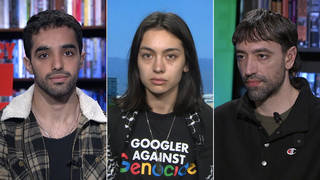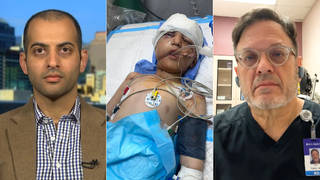
Related
Radio producer Dave Isay yesterday released “The Execution Tapes,” 19 recordings of the 23 electrocutions carried outby the state of Georgia since 1984. They are the only recordings of executions in the United States.
Attorney Michael Meers, in the course of research for a lawsuit over the constitutionality of the electric chair,discovered the tapes in 1998. They were recorded internally by the Georgia Department of Corrections as an officialrecord of the executions.
Isay found out about the tapes a month and a half ago. He brought them to National Public Radio’s “All ThingsConsidered” with a single condition: that the program include an entire, uncut execution. NPR rejected his offer.He then went to New York public radio station WNYC, which produced the program in conjunction with Isay’s independentradio company, Sound Portraits Productions. Last night, a number of public radio stations around the countrybroadcast this unprecedented radio event, some of then preempting NPR’s All Things Considered.
Today, on Democracy Now!, we will play for the first time a complete recording of a botched execution. But first wewill begin with the tape of a so-called perfect execution. These recordings were made by the Georgia Department ofCorrections at its Diagnostic and Classification Prison, where the state performs its executions.
The release of the tapes adds to the debate over whether executions should be public. The impending execution ofTimothy McVeigh, the Oklahoma City bomber, has galvanized debate on the issue. The 250 survivors and families of thebombing victims asked to witness the execution, and Attorney General John Ashcroft complied. They will watch theexecution on closed circuit television. McVeigh then said that the rest of the nation should be able to witness theexecution as well. Ashcroft denied the request.
Supporters of public executions fall on both sides of the debate over the death penalty. Some say that, given thatAmerica has voted to execute people, then America should be able to see or hear what they have chosen. Others saythat public executions would serve as a crime deterrent. Opponents of public executions say that the event wouldturn into a sensationalist spectacle. Public executions were ended in 1936, after a crowd of some 20,000 climbedtelephone poles, stood on rooftops and jammed streets in Owensboro, Kentucky to watch the hanging of anAfrican-American man, Rainey Bethea, convicted of raping his white employer.
Guests:
- Dave Isay, the independent radio producer who released the tapes and founder of Sound PortraitsProductions.
- Gary Covino, co-producer and editor of the WNYC Radio and Sound Portraits Productions “A Public RadioSpecial Report: The Execution Tapes.”
Related links:
- Sound Portraits -for the complete audio recordings of 19electrocutions carried out by the state of Georgia since 1983.
- Inside.com–Has link to story entitled: “NPR StaffersAstonished by Decision Not to Air Executions, which went to WNYC Instead











Media Options